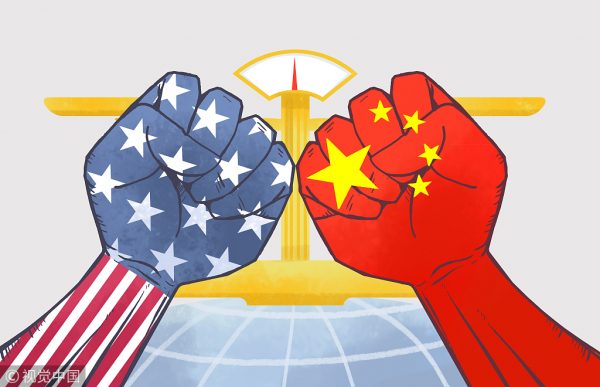
Escalating trade friction between China and the United States, initiated largely by the Trump administration, will not have a significant impact on the Chinese economy, said a researcher with a top government institution on Monday.
Rather, it will reduce jobs in the US and weaken the US dollar, said Wang Changlin, vice-president of the Academy of Macroeconomic Research under the National Development and Reform Commission, the nation’s top economic regulator.
China proposed an extra 25 percent tariff on a list of US products, such as soybean and pork, last week in response to the US’ imposing of steep tariffs on $50 billion worth imports of Chinese products.
The tariffs will have limited impact on China’s domestic job market and consumer inflation, as the Chinese economy remains stable with good momentum for the moment and in the long term, said Wang.
According to Wang, the US tariff package only accounts for 11.6 percent of Chinese exports to the US and 2.2 percent of China’s overall exports in 2017.
If exports to the US dropped as a result of the US tariffs, its impact on China’s economic growth would be slight and China can still achieve its GDP growth target of about 6.5 percent, job increase target of more than 11 million, and urban surveyed unemployment control target of less than 5.5 percent for this year, he said.
China’s urban surveyed unemployment rate was 5 percent in the first two months, according to a statement of the National Bureau of Statistics on Monday.
China’s proposed tariffs on US soybean and pork will have limited impact on domestic consumer inflation measured by the consumer price index, he added. Estimates show that if domestic soybean prices rose by 25 percent, China’s CPI will still be kept at an average of 2.4 percent, well below the control target of 3 percent, for this year. Considering the fact that China can import such products from other countries, the real effect will be even smaller, Wang said.
In the mean time, it’s challenging for the US to find another country to replace China to absorb its soybean supply and if China stops soybean import from the US, it will result in reduction of domestic value-added in related sectors of up to $12.9 billion and job losses of up to 86,000 people in the US, he said.
Moreover, the dollar may further weaken in international currency markets following the trade friction between China and the US as investors do not expect good results for the US economy from the trade tensions, Wang said.


